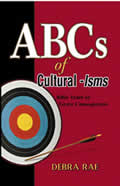ISRAEL,
GOD'S GLORY: WHAT HOPE ISHMAEL?
PART 1
By
Debra Rae
October 11, 2015
NewsWithViews.com
Part 1, Divine Prerogative
The late Columbia University English professor Edward Said opined, "Facts get their importance from what is made of them in interpretation."[1] Arguably, nothing lends itself more handily to this maxim than stories surrounding progeny of Abraham’s sons, Ishmael and Isaac, whose respective accounts crisscross divine prerogative with bitter sibling rivalry and, at long last, surety of God’s promises.[2]
Scripture provides the facts: Founder of the Hebrew nation, Father Abraham was the son of Terah, a presumed idolater from Ur of the Chaldees (today, Iraq). The word Hebrew means, “the immigrant.” At God’s bidding, Abram journeyed to Canaan with his family; and when Terah died, Abram entered this land, which God had promised him for an inheritance.
About 2089 B.C., a famine in Canaan forced Abram and wife Sarai to leave for Egypt. Well past middle age, but still childless upon their return, Sarai despaired of giving her husband an heir, so she offered her Egyptian maid as Abraham’s legal concubine. In time, Sarah bore the son of promise. Births of Ishmael (mothered by Hagar) and, thirteen years later, Isaac (mothered by Sarai) set the stage for unfolding drama current to this day.[3]
You see, Ishmael is distinguished as progenitor of Arabs who follow the tradition of Islam.[4] But Scripture expressly states, “It pleased the Lord to bless Israel”[5] through Abraham’s long-awaited miracle child with Sarah—notably Isaac, not Ishmael. Rightfully so, the sovereign Creator of the universe exercised divine prerogative to choose “a special people unto Himself, above all people that are upon the face of the earth."[6]
Trouble in River City
Ironically, in the very region known for endless rivalry, standard greetings impart the message of peace, both in Hebrew (shalom) and Arabic (alayhi as-salam); but peace absconds descendants of Isaac and Ishmael. In the words of historian Howard Zinn, "History is always a matter of taking sides.”[7] Such is the case with these half-brothers.
Understandably, Sarah favored Isaac and increasingly disdained Ishmael. When his younger brother was weaned, Ishmael openly mocked Isaac.[8] For Sarah, this was the proverbial straw that broke the camel’s back.[9] The root idea of her name is “to rule,” which characterization fits well Sarah’s personality. At her persistent demand, Hagar and Ishmael were cast away from their nuclear family and thrust into the wilderness.[10]
Abrahamic Covenant
Where was God in this? In the presence of (and for the benefit of) Abraham and his progeny, God made a solemn, sacred blood covenant—with Himself.[11] While Abram literally slept, God alone traversed the blood-covered trail between slaughtered animal sacrifices, thereby swearing to Himself (as the sole, authoritative witness) to uphold His promises.[12] Notably, God’s promise to Abram came with no expiration date, nor were conditions imposed. Whatever Abram did, or failed to do, God swore (1) to multiply his seed as the stars of heaven and (2) to grant the land “from the river of Egypt as far as the great river, the river Euphrates.”[13]
The Lord made certain his promises by transforming Abram and Sarai into new people and imparting to each the gift of a new name mirroring new capacities. Hence, Abram (Hebrew ‘avram, “exalted father”) became Abraham (Hebrew ‘avraham, “father of a multitude”).[14] Previously known as Sarai (“princely” or “a princess”),[15] the patriarch’s wife became Sarah (“chieftainness” or “queen”).[16]
As a sign of the covenant between God and Abraham, Ishmael and Isaac both partook of the rite of circumcision.[17] Though death intervened before God’s promises to Abraham were fully realized, Abraham saw them “afar off” because, by faith, he firmly believed God would make good His promises, even those not fulfilled in Old Testament times.
The “Rub”
Through Isaac, God’s plan involves and even features Israel,[18] distinguished in Scripture as “center of the Earth.” Truly, Israel is His “heritage” foreordained to “blossom as a rose”—to lend, not borrow and to reign, not be reigned over.[19] Ezekiel described national Israel as “living securely” after returning from many nations.[20] God made of Abraham a great nation through which all families worldwide would be blessed,[21] but what of Ishmael?
It mustn’t be overlooked that the Abrahamic blood covenant established between God and Abraham’s seed includes Ishmael—Abraham’s first and, in fact, only son for thirteen years. Isaac was favored, true, yet God by His very nature is not partial, nor is He a respecter of persons.[22] Even so, He is God after all; and His judgments are just. Tellingly, it’s no coincidence that Ishmael’s name means “God hears” (more on that later).
At first glance, biblical portrayal of Ishmael seems unflattering. In having been born of a concubine, Ishmael “jumped the gun” on God’s plan—this, through no fault of his own.[23] Still, Ishmael is depicted as a “wild ass of a man”;[24] hence, in biblical typology, Ishmael speaks to the self-life and carnality. Scripturally, Egypt typifies the world system, and “Arab” means “to lie in wait.” Predictably, Ishmael married an Egyptian woman. Down the line, Ishmaelites demonstrated said posture in having bought and enslaved Joseph, sold by his own brothers.
Keep in mind that, through Ishmael as well as Isaac, Abraham became father of “many nations.” Ishmael was not heir with Isaac to the promise but, in fact, he was heir to a promise. God made Ishmael fruitful with “numerous descendants.”[25] Because he was Abraham’s seed (and for Abraham’s sake), Ishmael bore twelve sons and a daughter who themselves became princes and progenitors of many tribes. Dwelling in the wilderness of Paran (loosely meaning, “to glorify”), Ishmael was distinguished as a famous archer.
The Father’s Heart
Remember, Hagar was no interloper, but had been invited as a legal concubine into the family. Just imagine 86-year-old Abraham’s thrill when Ishmael was born! We know Abraham loved his son because, even after God reaffirmed His promise of a son by Sarah, Abraham fervently exclaimed, “O that Ishmael might live before Thee!”[26] Clearly, Abraham had Ishmael’s best interest at heart and, as any loving father would do, he repeatedly stood up for his son.
A very special blessing, Ishmael was embraced by Abraham who raised and nurtured his firstborn for thirteen years before Isaac came along. Despite Sarah’s animosity, Abraham continued to care. His was a father’s heart. When Ishmael and his mother were sent away, Abraham rose early to provide them with water and bread.
|
|
God also loved Ishmael.[27] Recall that Ishmael was first to get a God-picked name meaning “God hears.” When Hagar and Ishmael were cast out, death of the child seemed imminent. The Lord heard of their misery,[28] and an angel of the Lord came to their aid.[29] Scholars distinguish this visitation as the angel of Yahweh, manifestation of God Himself. God heard Hagar’s cries, but also the voice of Ishmael, for “God was with the lad.”[30]
Twice releasing ministering angels on behalf of Ishmael, God remained ever mindful of Abraham’s firstborn. Truly there was (and is) hope for Ishmael.
More to follow in Part 2.
Click here for part -----> 1, 2,
� 2015 Debra Rae - All Rights Reserved
Footnotes:
1.
Edward
W. Said - Accessed 23 January 2014.
2.
John C. Whitcomb, Jr., Th.D. Study-Graph Third Revised Edition
(Chicago: Moody Press, 1968).
3.
T. Alton Bryant, Editor. The New Compact Bible Dictionary Special
Crusade Edition (Grand Rapids: Zondervan Publishing House, 1967).
4.
The Qur’an mentions Ismael numbers of times in which the message
revealed by God to Ishmael was the same he revealed to Abraham, Isaac,
Jacob, Moses and Jesus. His cry was “Make us Muslims” (Sura
3:84). The Qur’an characterizes Ishmael as a man of constancy
and patience and, as such, favored of Allah, chosen and guided into
a straight way (Sura 6:86) as a righteous recipient of god’s mercy
(Sura 21:85). Accepted of the lord as a messenger and prophet, Ishmael
enjoined prayer and charity (Sura 19:54-55). Allah charged him with
sanctifying his house for prayer (Sura 19:54-55 2:125-129).
5.
Numbers 24:1.
6.
Deuteronomy 7:6.
7.
Mary Grabar. The Bad
History” of Howard Zinn and the Brainwashing of America: The People
Speak. America’s Survival, Inc., Accessed 23 January
2014.
8.
Genisis 21:9
9.
http://en.wikipedia.org.
Accessed 10/28/13; Matthew 5:22 (ESV)—“But I say to you
that everyone who is angry with his brother will be liable to judgment;
whoever insults his brother will be liable to the council; and whoever
says, ‘You fool!’ will be liable to the hell of fire.”
10.
Genisis 21:10
11.
Keep in mind that a blood covenant can be the undertaking of one of
the parties involved, as is seen in Genesis 15.
12.
By definition, a covenant was a mutual agreement between two or more
persons to do, or refrain from doing, certain acts. Blood covenants
were the most solemn among biblical covenants (i.e., Edenic, Noachian,
Sinaitic, Levitical, Davidic, etc.). By way of explanation, all parties
participating in blood covenants walked between slaughtered animal sacrifices
to confirm their covenant one with the other. In the Bible, God Himself
is regarded as the witness of this pact (Gen. 31:50; 1 Sam. 20:8). Said
covenants are made before Him.
13.
Genesis 22:17— “I will surely bless you and make your descendants
as numerous as the stars in the sky and as the sand on the seashore.
Your descendants will take possession of the cities of their enemies.”
14.
Abrams
Transformation To Abraham. Accessed 26 September 2015
15.
All
women bible, Sarah, Sarai, Sara. Accessed 26 September 2015.
16.
Isaiah 49:23.
17.
Even before the physical act of circumcision, Abraham was deemed righteous
by his faith—faith that secular Jews refuse. Paul understood that
circumcision is more a matter of spirit than anatomy (Romans 9:6-13).
18.
Israel means “princes or prevailers with God,” as pertaining
to national Israel (under Old Covenant law) and spiritual Israel (under
the New Covenant—some Jews, as Paul; others, Gentiles). Israel
is used to designate the son of Isaac (Jacob) or his descendants, the
twelve tribes of the Hebrews. It refers specifically to the nation’s
ten northern tribes, as opposed to Judah in the South.
19.
Ezekiel 28:25—God expressly says they will “live safely
in their own land, which He gave His servant Jacob.”
20.
“It pleased the Lord to bless Israel” (Numbers 24:1). God
will “gather them from the ends of the earth,” and a great
throng shall return (Jeremiah 31:8). “Jacob my servant, Israel
whom I have chosen,” I will “pour my Spirit upon your offspring,
and my blessing on your descendants” (Isaiah 44:1-28). "Speak
kindly to Jerusalem” … “that her iniquity has been
removed” (Isaiah 40:1-2). The prophet Ezekiel announced that God
will take back, gather, cleanse, and put in a new heart/ spirit inclined
to follow His decrees and laws. They will be His people, and He their
God (Ezek. 36:24-28).
21.
22.
Acts
10:34
23.
Psalm 34:19: “Many are the afflictions of the righteous [whether
Jew or Gentile], but the LORD delivers him out of them all.”
24.
Genesis 16:12.
25,
Genesis 16:10.
26,
Genesis 17:18.
27,
"Behold, children are a heritage from the Lord, the fruit of the
womb a reward,” Psalm 127:3. "For you formed my inward parts;
you knitted me together in my mother's womb… My frame was not
hidden from you, when I was being made in secret, intricately woven
in the depths of the earth. Your eyes saw my unformed substance,"
Psalm 139:13-16. "Before I formed you in the womb I knew you, and
before you were born I consecrated you,” Jeremiah 1:5.
28,
Genesis 16:11.
29,
Genesis 16:7.
30,
Genesis 21:20.













 Share
This Article
Share
This Article





